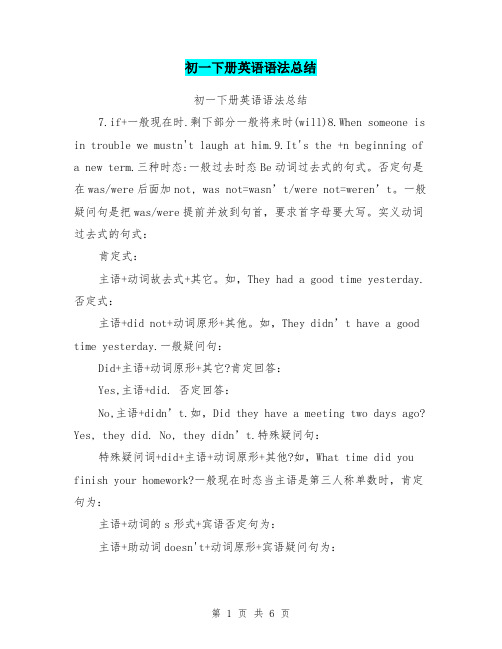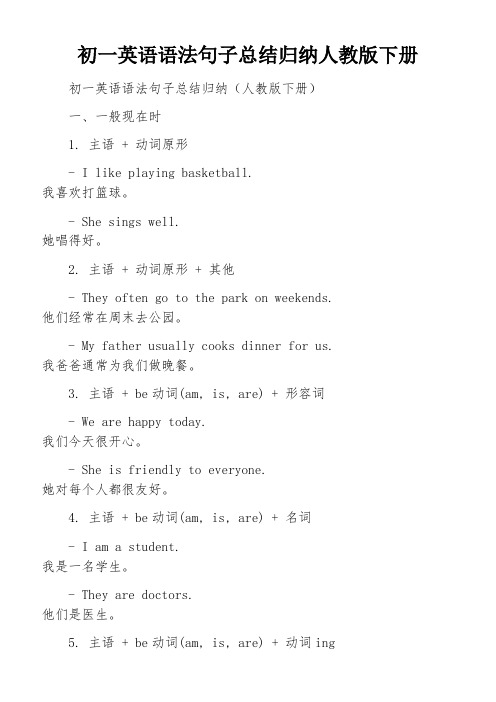英语语法(初一下册)
- 格式:doc
- 大小:26.50 KB
- 文档页数:3

初一下册英语语法总结初一下册英语语法总结7.if+一般现在时.剩下部分一般将来时(will)8.When someone is in trouble we mustn't laugh at him.9.It's the +n beginning of a new term.三种时态:一般过去时态Be动词过去式的句式。
否定句是在was/were后面加not, was not=wasn’t/were not=weren’t。
一般疑问句是把was/were提前并放到句首,要求首字母要大写。
实义动词过去式的句式:肯定式:主语+动词故去式+其它。
如,They had a good time yesterday.否定式:主语+did not+动词原形+其他。
如,They didn’t have a good time yesterday.一般疑问句:Did+主语+动词原形+其它?肯定回答:Yes,主语+did. 否定回答:No,主语+didn’t.如,Did they have a meeting two days ago? Yes, they did. No, they didn’t.特殊疑问句:特殊疑问词+did+主语+动词原形+其他?如,What time did you finish your homework?一般现在时态当主语是第三人称单数时,肯定句为:主语+动词的s形式+宾语否定句为:主语+助动词doesn't+动词原形+宾语疑问句为:Does+主语+动词原形+宾语肯定回答和否定回答也要使用助动词does.注:第三人称单数用了 does 后面就不用动词的s形式了,而用动词原形.动词的一般现在时态, 除了第三人称单数(he she it) 外,其余都用动词原形。
当主语是其他人称时,肯定句为:主语+动词原形+宾语否定句为:主语+助动词don't+动词原形+宾语疑问句为:Do+主语+动词原形+宾语肯定回答和否定回答也要使用助动词do.注:变为疑问句,要在句首加"do" ; 变为否定句, 要在动词前面加"do not", 可以简写为 "don't".知识点:1.现在进行时的主要结构用来表示现在(说话瞬间)正在进行的动作和用来表示当前的活动或现极端一直在进行着的动作。

七年级下册英语1单元语法
七年级下册英语1单元的语法重点主要包括现在进行时和be动词的用法。
现在进行时表示正在进行的动作或正在发生的事情。
其基本结构是“be动
词+动词的现在分词”,例如“I am writing a letter”表示我正在写一封信。
现在进行时通常与now、at the moment等时间状语连用,也可以表达计
划或安排将要发生的动作。
be动词是英语中最基本的动词之一,用于表示存在、状态或身份等。
其基
本形式包括am、is、are等,具体使用哪个形式需要根据主语的人称和数来决定。
例如,“I am a student”表示我是学生,“They are playing basketball”表示他们正在打篮球。
此外,be动词也可以与其他动词一起
构成被动语态,表示动作的接受者是动作的执行者。
除了这些基本用法外,七年级下册英语1单元还涉及到了一些扩展的语法点,例如形容词和副词的比较级和最高级、时间状语从句等。
这些知识点需要学生在学习过程中逐步掌握并加以应用。

七年级英语下册全部语法知识点总结Unit 1 Can you play the guitar?1. 情态动词+V原can do= be able to do2. Play+ the+ 乐器+球类,棋类3. join 参加社团、组织、团体4. 4个说的区别:say+内容Speak+语言Talk 谈论talk about sth talk with sb talk to sbTell 告诉,讲述tell sb (not)to do sthTell stories/ jokes5. want= would like +(sb)to do sth6. 4个也的区别:too 肯定句末(前面加逗号)Either否定句末(前面加逗号)Also 行前be 后As well 口语中(前面不加逗号)7. be good at+ V-ing=do well in 擅长于be good for 对…有益(be bad for对…有害)be good to 对…友好(good 可用friendly,nice,kind替换)be good with和…相处好=get>8. 特殊疑问句的构成:疑问词+一般疑问句9. How/ what about+V-ing …怎么样?(表建议)10. 感官动词(look, sound, taste, smell, feel)+adj/ like11. 选择疑问句:回答不能直接用Yes或者No,要从中选择一个回答12. students wanted for school show(wanted表示招募,含有被动意义)13. show sth to sb=show sb sthgive sth to sb=give sb sth14. help sb (to)do sthHelp sb with sthWith sb’s help= with the help of sbHelp>15. be busy doing sth/ be busy with sth16. need to do sth17. be free= have time18. have friends= make friends19. call sb at +电话号码20.on the weekend= on weekends21. English-speaking students 说英语的学生(带有连词符,有形容词性质)22. do kung fu表演功夫Unit 2 What time do you go to school?1. 问时间用what time或者whenAt+钟点at 7 o’clockat noon/ at night(during/ in the day)On+ 具体某天、星期、特指的一天on April 1st on Sunday on a cold winter morning In +年、月、上午、下午、晚上2. 时间读法:顺读法逆读法:分钟≤30用pastfive past eight(8:05)half past eight(8:30)分钟>30用to a quarter to ten(9:45)整点用…o’clock 7 o’clock(7:00)3. 3个穿的区别:wear 表状态,接服装、手套、眼镜、香水等Put>Dress 表动作,接sb/>4. from…to…5. be/ arrive late for6. 频度副词(行前be后)Always usually often sometimesseldom hardly never7. 一段时间前面要用介词forfor half an hour for five minutes8. eat/ have…for breakfast/ lunch/ dinner/ supper9. either…or10. a lot of=lots of11. it is +adj+for sb +to do sth (adj修饰to do sth)It is important for me to learn English.it is +adj+of sb +to do sth (adj修饰sb)It is kind/ friendly/ nice of you to help me.12. 感叹句:How+adj+主谓!How+adj+a/an +n单+主谓!What+ a/an +adj+ n单+主谓!What+ adj+ n复/ 不可数+主谓!Unit 3 How do you get to school?1. 疑问词How 如何(方式)how long 多长(时间)答语常用“(For/ about +)时间段”how far多远(距离)答语常用“(It’s +)数词+miles/ meters/ kilometers”how often多久一次(频率)答语常用“Always/ often/ every day/…”或“次数+时间”等表频率的状语How soon多快,多久以后,常用在将来时中。

七年级下册英语语法知识点总结(一)七年级下册英语语法知识点总结前言作为一名资深的创作者,我深知语法对于英语学习的重要性。
掌握正确的语法知识不仅能提高我们的英语表达能力,还能帮助我们理解和阅读他人的英文文章。
在七年级下册的英语学习中,有一些重要的语法知识点需要我们掌握和应用。
接下来我将为大家总结这些知识点,希望能对大家的学习有所帮助。
正文以下是七年级下册英语语法知识点的总结:1. be动词的用法•be动词用于描述人或物的状态、身份、特征等。
•be动词根据主语的单数、复数和第三人称的不同形式有变化。
•be动词用于构成一般现在时、一般过去时等时态。
2. 一般现在时的构成和用法•一般现在时用于表达经常发生的动作、客观事实等。
•一般现在时的肯定句结构为:主语 + 动词原形。
•一般现在时的否定句结构为:主语 + do/does + not + 动词原形。
•一般现在时的疑问句结构为:Do/Does + 主语 + 动词原形 + 其他?3. be动词在一般现在时的用法•be动词在一般现在时的肯定句结构为:主语 + am/is/are。
•be动词在一般现在时的否定句结构为:主语 + am/is/are + not。
•be动词在一般现在时的疑问句结构为:am/is/are + 主语 + 其他?4. 一般过去时的构成和用法•一般过去时主要用于描述过去发生的动作或状态。
•一般过去时的肯定句结构为:主语 + 动词过去式。
•一般过去时的否定句结构为:主语 + did not + 动词原形。
•一般过去时的疑问句结构为:Did + 主语 + 动词原形 + 其他?5. be动词在一般过去时的用法•be动词在一般过去时的肯定句结构为:主语 + was/were。
•be动词在一般过去时的否定句结构为:主语 + was/were not。
•be动词在一般过去时的疑问句结构为:Was/Were + 主语 + 其他?•一般将来时用于描述将来要发生的动作或事件。

初一下册英语语法讲解英语语法对于初学者来说可能是一个比较困难的挑战,但掌握好语法的基本知识是学好英语的重要一步。
在初一下册的英语学习中,我们将会学习到一些基本的语法规则和用法。
本文将为大家详细讲解这些语法知识。
一、名词名词是指人、事物、地点等的名称。
在英语中,名词具有单数和复数两种形式。
一般情况下,名词的复数形式是在词尾加上-s或-es。
例如:- 单数:dog(狗)- 复数:dogs(狗们)有些名词的复数形式比较特殊,需要掌握其规则。
例如:- 单数:baby(婴儿)- 复数:babies(婴儿们)二、动词动词是句子的核心,用于表示动作、状态或存在。
在英语中,动词的时态包括一般现在时、一般过去时和一般将来时等。
1. 一般现在时一般现在时描述的是经常性或习惯性的动作、真理、感觉等。
一般现在时的肯定句结构为主语+动词原形;否定句结构为主语+do/does+not+动词原形;疑问句结构为Do/Does+主语+动词原形?例如:- 肯定句:I like basketball.(我喜欢篮球。
)- 否定句:I do not like basketball.(我不喜欢篮球。
)- 疑问句:Do you like basketball?(你喜欢篮球吗?)2. 一般过去时一般过去时描述的是过去发生的动作或存在的状态。
一般过去时的肯定句结构为主语+动词过去式;否定句结构为主语+did+not+动词原形;疑问句结构为Did+主语+动词原形?例如:- 肯定句:She visited her grandparents last week.(她上周拜访了她的祖父母。
)- 否定句:She did not visit her grandparents last week.(她上周没拜访她的祖父母。
)- 疑问句:Did she visit her grandparents last week?(她上周拜访了她的祖父母吗?)3. 一般将来时一般将来时描述的是将来要发生的动作或存在的状态。

初一英语语法句子总结归纳人教版下册初一英语语法句子总结归纳(人教版下册)一、一般现在时1. 主语 + 动词原形- I like playing basketball.我喜欢打篮球。
- She sings well.她唱得好。
2. 主语 + 动词原形 + 其他- They often go to the park on weekends.他们经常在周末去公园。
- My father usually cooks dinner for us.我爸爸通常为我们做晚餐。
3. 主语 + be动词(am, is, are) + 形容词- We are happy today.我们今天很开心。
- She is friendly to everyone.她对每个人都很友好。
4. 主语 + be动词(am, is, are) + 名词- I am a student.我是一名学生。
- They are doctors.他们是医生。
5. 主语 + be动词(am, is, are) + 动词ing- He is playing football in the park.他正在公园里踢足球。
- We are watching a movie at home.我们正在家里看电影。
二、一般过去时1. 主语 + 动词过去式- I listened to music yesterday.昨天我听音乐。
- She played chess with her friends last night.昨晚她和朋友下棋。
2. 主语 + be动词(was, were) + 形容词- He was tired after school.放学后他感到累。
- They were happy at the party.派对上他们很快乐。
3. 主语 + be动词(was, were) + 名词- I was a student two years ago.两年前我是一名学生。
七年级英语下册语法总结一、七年级下英语语法——词法1、名词A)、名词的数我们知道名词可以分为可数名词和不可数名词,而不可数名词它没有复数形式,但可数名词却有单数和复数之分,复数的构成如下:一)在后面加s。
如:fathers, books, Americans, Germans, apples, bananas二)x, sh, ch, s, tch后加es。
如:boxes, glasses, dresses, watches, wishes, faxes三)1)以辅音字母加y结尾的变y为i再加es 如:baby-babies, family-families, duty-duties, comedy-comedies, documentary-documentaries, story-stories2)以元音字母加y结尾的直接加s。
如:day-days, boy-boys, toy-toys, key-keys, ways 四)以o结尾加s(外来词)。
如:radios, photos, 但如是辅音加o的加es:如: tomatoes 西红柿, potatoes马铃薯五)以f或fe结尾的变f为v再加es(s)。
如:knife-knives, wife-wives, half-halves,shelf-shelves, leaf-leaves, yourself-yourselves六)单复数相同(不变的)有:fish, sheep, deer鹿子, Chinese, Japanese七)一般只有复数,没有单数的有:people,pants, shorts, shoes, glasses, gloves, clothes, socks八)单词形式不变,既可以是单数也可以是复数的有:police警察局,警察, class班,同学, family家,家庭成员九)合成的复数一般只加主要名词,多数为后一个单词。
Unit 1
一询问某人住在哪里:
结构:Where do/does sb live ?
Eg: Where do you live ? 你住在哪里?
Where does your pen pal live? 你的笔友住在哪里?
回答:
结构:sb live(s) in sw
Eg:I live in Toronto,Canada. 我住在加拿大多伦多。
My pen pal lives in Beijing. 我的笔友住在北京。
二询问某人讲什么语言:
结构:问What language do/does sb speak? 答sb speak(s)+语言
Eg: What language do you speak? 你说什么语言?——I speak Chinese.我说汉语
What language does lucy speak? 露西说什么语言?——She’s speak English.她说英语常用国家有关信息表:
1,Favorite=like sth best
结构:What’s one’s favorite sth?=What do/does sb like best?
2,选择疑问句就是在一般疑问句后加OR加选择对象,回答时不能用yes,no3,want后加do或does;want=wouldlike在里面
in在上下午
在年或月。
人教版初一(下)英语重点语法汇总你几点去上学?I go to school at 8 o'clock.我八点去上学。
2.when翻译为“什么时候”,问的是时间点或时间段。
回答可以用具体时间,也可以用时间段。
When do you usually get up?你通常什么时候起床?I usually get up at 6 o'clock.我通常六点起床。
或者:I usually get up in the morning.我通常早上起床。
二、一般现在时的用法1.表示现在正在进行或经常性的动作或状态。
例如:I am reading a book now.我正在看书。
___.他放学后经常打篮球。
2.表示客观真理、科学事实或经常性的动作或状态。
例如:___.地球绕着太阳转。
Water boils at 100 degrees Celsius.水在100度时沸腾。
3.表示未来的安排或计划。
例如:___.我们明天去北京。
___ arrives at 8 o'clock tonight.火车今晚八点到达。
三、一般现在时的构成一般现在时的肯定句结构为:主语+动词原形(第三人称单数要加-s)+其他。
例如:I like ___ football.我喜欢踢足球。
She studies hard every day.她每天都努力研究。
否定句在动词前加___'t,疑问句将助动词do/does提前。
例如:I don't ___.我不喜欢打篮球。
Does he often watch TV?他经常看电视吗?What time do you go to school?I go to school at 7:30 in the morning.When asking about time。
"when" can be used to ask for a specific time or a general time frame。
初一下册英语语法
1.Love to do sth.=love doing sth.
2.Take a walk=have a walk
3.enjoy:
enjoy doing sth.
Have fun=have a good time=enjoy oneself.
4.*the beginning of…..
例:this is beginning of new life.
*at the beginning of+时间
5.*there be+人(物)+地点
*There is a desk and two chairs in the room.
*what is(用单数提问) on the desk?
6.in hospital (住院)、in a(the) hospital(在医院)例:My uncle is ill, so he is in hospital.
7.talk: to
*talk to=talk with(与……交谈)例:I often talk my student.
with
*talk about sb.(sth.) 谈论某人某事.
8.*give sb. Sth=give sth to sb.
*want sb. to do sth.例:I want you to listen to me carefully.
work
9.*be late for 为……迟到
school…….
*buy(make,cook,get,draw,sing) sb. sth=buy……sth for sb.
10.*be busy doing=be busy with.(忙于做什么)
sb.
11.thank for 例:thanks for your help=thanks for helping me .
doing
12.*surprised:
at+sb.(sth)
be surprised to do sth.
that+句子
*surprise.(n.)
to one’surprise(放在句头) 令人惊讶的
放在句尾) 惊奇的
例:To my surprise,he can speak Chinese well .
He ask me in surprise,”…..”
13.*Everything is going well.一切胜利
14.* other, others,the other,the others
other+n.(另外的)
the other (one ……the other)另一个。
例I have two hands,one is deam,the other is dirty . others(余下的)(不全部)
the others(余下的)(全部)
15.*on vacation
16.in this heat(在这么热的)
the weather is ……
感叹句:what bad weather!=how bad the weather is!
17*.everyone is
18.*stop:
停止做某事例:stop talking(不要说) stop
停下来去做某事例:stop to talk(要说) 19.love:
1.to do sth.
love
doing sth.
20.joke:
tell a joke with sb.=play a joke on sb.(与……玩笑)
21.not……any more(不再)例:I not child any more.
22*.would like=want
sth.
would
to do sth.
Yes,please.
*Would you like a glass of orange juice ? 回答:
No, thanks.
Would you like some cakes?(在征求别人意见时some不用变)
23.*practice:
+n.
practice
doing sth.
24.*write a report on ……(写一篇关于…..的报告)
25.think of=think about.
What do you think of the film?=How do you like the film?=How is the film? 26.make:
*make sb. sth.=make sth. for sb.
*make(令) sb.(sth.)+adj.例:We must make our classroom clean.
*make sb. do sth.例:Don’t make the boy cry.
27.*have fun doing sth.(做某事有趣)
例:We had fun reading in the classroon.
28.*find sb. doing sth.(发现某人做某事)
例:I find a boy crying in the corner.
29.*help:
to do sth
help sb. =help sb.with sth.
do sth
例:I often help my mother clean the house.
30.finish(完成)
finish doing sth.
’t stand …..(对……忍无可忍)
can’t stand to do sth.(忍不住做某事)
例:When we have a math lesson, some students always can’t stand laugh.
32.*mind:
doing sth. Never mind.
mind 回答:
(只能用于否定句或疑问句中) Not at all.
33.*Why don’t you do sth.….?=Why not do sth.…..
34.*Be good at=do well in
35.*spend:
money
spend on sth.例: I spend 5 yuan on food.
Time
money
spend in doing sth.例:I spend 5 yuan buying book every week.
time
36*Why not do sth.=Why don’t do sth.
例:Why not swim this afternoon?=Why don’t you do sth?.=Shall we swim this afternoon? 37* have to 不得不(客观)(外来因素)
have to do sth.
must 必须(具有命令性)
38*be late for=arrive late for
39*through,,across ,past
through(从中穿过),across(从上越过),past(从旁边经过)
例:go through the door.(穿过门)
go across the wall(爬上墙而过)
go past school(从学校旁边过)
40*take a taxi, by taxi.
My father takes a taxi to work every day.=My father goes to work by taxi.
41. to do sth.
hope。